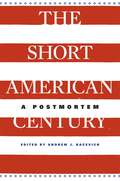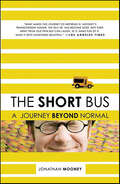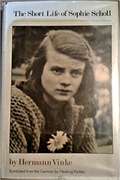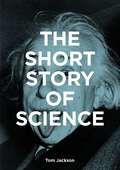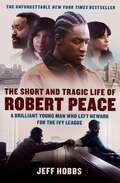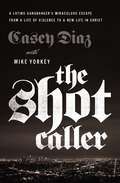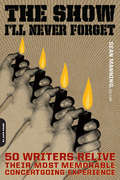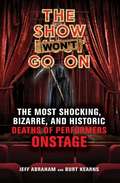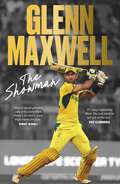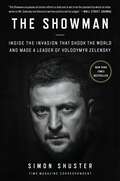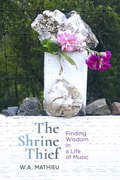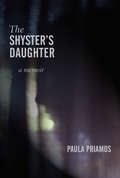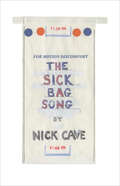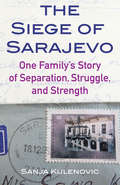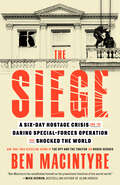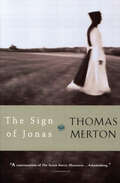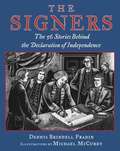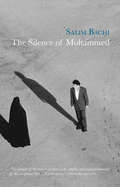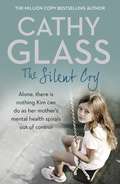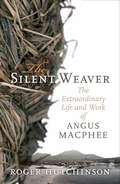- Table View
- List View
The Short American Century
by Edited by Andrew J. BacevichWriting in Life magazine in February 1941, Henry Luce memorably announced the arrival of the “The American Century. ” The phrase caught on, as did the belief that America’s moment was at hand. Yet as Andrew J. Bacevich makes clear, that century has now ended, the victim of strategic miscalculation, military misadventures, and economic decline. To take stock of the short American Century and place it in historical perspective, Bacevich has assembled a richly provocative range of perspectives. What did this age of reputed American preeminence signify? What caused its premature demise? What legacy remains in its wake? Distinguished historians Jeffry Frieden, Akira Iriye, David Kennedy, Walter LaFeber, Jackson Lears, Eugene McCarraher, Emily Rosenberg, and Nikhil Pal Singh offer illuminating answers to these questions. Achievement and failure, wisdom and folly, calculation and confusion all make their appearance in essays that touch on topics as varied as internationalism and empire, race and religion, consumerism and globalization. As the United States grapples with protracted wars, daunting economic uncertainty, and pressing questions about exactly what role it should play in a rapidly changing world, understanding where the nation has been and how it got where it is today is critical. What did the forging of the American Century-with its considerable achievements but also its ample disappointments and missed opportunities-ultimately yield? That is the question this important volume answers.
The Short Bus: A Journey Beyond Normal
by Jonathan MooneyA young man once called unteachable journeys across America to investigate the lives of those, like himself, who are forced to create new ways of living in order to survive Labeled "dyslexic and profoundly learning disabled with attention and behavior problems," Jonathan Mooney was a short bus rider--a derogatory term used for kids in special education and a distinction that told the world he wasn't "normal. " Along with other kids with special challenges, he grew up hearing himself denigrated daily. Ultimately, Mooney surprised skeptics by graduating with honors from Brown University. But he could never escape his past, so he hit the road. To free himself andto learn how others had moved beyond labels, he created an epic journey. He would buy his own short bus and set out cross-country, looking for kids who had dreamed up magical, beautiful ways to overcome the obstacles that separated them from the so-called normal world. InThe Short Bus, his humorous, irreverent, and poignant record of this odyssey, Mooney describes his four-month, 35,000-mile journey across borders that most people never see. He meets thirteen people in thirteen states, including an eight-year-old deaf and blind girl who likes to curse out her teachers in sign language. Then there's Butch Anthony, who grew up severely learning disabled but who is now the proud owner of the Museum of Wonder. These people teach Mooney that there's no such thing as normal and that to really live, every person must find their own special ways of keeping on. The Short Bus is a unique gem, propelled by Mooney's heart, humor, and outrageous rebellions.
The Short Bus: A Journey Beyond Normal
by Jonathan MooneyA young man once called unteachable journeys across America to investigate the lives of those, like himself, who are forced to create new ways of living in order to surviveLabeled "dyslexic and profoundly learning disabled with attention and behavior problems," Jonathan Mooney was a short bus rider—a derogatory term used for kids in special education and a distinction that told the world he wasn't "normal." Along with other kids with special challenges, he grew up hearing himself denigrated daily. Ultimately, Mooney surprised skeptics by graduating with honors from Brown University. But he could never escape his past, so he hit the road. To free himself and to learn how others had moved beyond labels, he created an epic journey. He would buy his own short bus and set out cross-country, looking for kids who had dreamed up magical, beautiful ways to overcome the obstacles that separated them from the so-called normal world.In The Short Bus, his humorous, irreverent, and poignant record of this odyssey, Mooney describes his four-month, 35,000-mile journey across borders that most people never see. He meets thirteen people in thirteen states, including an eight-year-old deaf and blind girl who likes to curse out her teachers in sign language. Then there's Butch Anthony, who grew up severely learning disabled but who is now the proud owner of the Museum of Wonder. These people teach Mooney that there's no such thing as normal and that to really live, every person must find their own special ways of keeping on. The Short Bus is a unique gem, propelled by Mooney's heart, humor, and outrageous rebellions.
The Short Life Of Sophie Scholl
by Hermann Vinke Ilse AichingerThe biography of the twenty-one year-old German student who was put to death for her anti-Nazi activities with the underground group called the White Rose.
The Short Story of Science: A Pocket Guide to Key Histories, Experiments, Theories, Instruments and Methods
by Tom Jackson Mark Fletcher'Nothing in life is to be feared. It is only to be understood. Now is the time to understand more, so that we may fear less' Marie CurieThe Short Story of Science is a new introduction to the complete subject of science. Covering 60 key experiments, from Archimedes' investigations of buoyancy to the discovery of dark matter, and then linking these to the history of science, as well as to the key theories and methods, the book simplifies and explains all the key breakthroughs.Accessible and concise, generously illustrated throughout, and with all the essential information presented without jargon, readers are given all the tools they need to enjoy the fascinating history of scientific knowledge.
The Short Story of Science: A Pocket Guide to Key Histories, Experiments, Theories, Instruments and Methods
by Tom Jackson Mark Fletcher'Nothing in life is to be feared. It is only to be understood. Now is the time to understand more, so that we may fear less' Marie CurieThe Short Story of Science is a new introduction to the complete subject of science. Covering 60 key experiments, from Archimedes' investigations of buoyancy to the discovery of dark matter, and then linking these to the history of science, as well as to the key theories and methods, the book simplifies and explains all the key breakthroughs.Accessible and concise, generously illustrated throughout, and with all the essential information presented without jargon, readers are given all the tools they need to enjoy the fascinating history of scientific knowledge.
The Short and Tragic Life of Robert Peace: A Brilliant Young Man Who Left Newark for the Ivy League
by Jeff Hobbs*Now a major motion picture—Rob Peace—starring Jay Will, Mary J. Blige, and Chiwetel Ejiofor* *Named a Best Book of the Year by The New York Times Book Review, Entertainment Weekly, and more* The New York Times bestselling account of a young African-American man who escaped Newark, NJ, to attend Yale, but still faced the dangers of the streets when he returned is, &“nuanced and shattering&” (People) and &“mesmeric&” (The New York Times Book Review).When author Jeff Hobbs arrived at Yale University, he became fast friends with the man who would be his college roommate for four years, Robert Peace. Robert’s life was rough from the beginning in the crime-ridden streets of Newark in the 1980s, with his father in jail and his mother earning less than $15,000 a year. But Robert was a brilliant student, and it was supposed to get easier when he was accepted to Yale, where he studied molecular biochemistry and biophysics. But it didn’t get easier. Robert carried with him the difficult dual nature of his existence, trying to fit in at Yale, and at home on breaks. A compelling and honest portrait of Robert’s relationships—with his struggling mother, with his incarcerated father, with his teachers and friends—The Short and Tragic Life of Robert Peace encompasses the most enduring conflicts in America: race, class, drugs, community, imprisonment, education, family, friendship, and love. It’s about the collision of two fiercely insular worlds—the ivy-covered campus of Yale University and the slums of Newark, New Jersey, and the difficulty of going from one to the other and then back again. It’s about trying to live a decent life in America. But most all this “fresh, compelling” (The Washington Post) story is about the tragic life of one singular brilliant young man. His end, a violent one, is heartbreaking and powerful and “a haunting American tragedy for our times” (Entertainment Weekly).
The Shot Caller: A Latino Gangbanger’s Miraculous Escape from a Life of Violence to a New Life in Christ
by Casey DiazWhen you feel like you've made too many missteps to go forward, how do you find the strength to carry on? Join Casey Diaz as he tells the remarkable story of God's heart for second chances.The son of El Salvadorian immigrants, Casey Diaz was brought to Los Angeles at the age of two. An abusive, impoverished family life propelled Casey into the Rockwood Street Locos gang at just eleven years old.Casey was willing to do anything to be number one, but years of chasing rival gang members led to a dramatic ambush and arrest by the LAPD. By age sixteen, Casey was sentenced to more than twelve years in solitary confinement in California's toughest prison as one of the state's most violent offenders.He thought his life was over--but as the days in solitary wore on, Casey realized someone else was calling the shots. What happened next can only be described as a miracle.Join Casey as he shares how we can all:Embrace the incredible gift of God's redeeming loveChange our lives for the betterFind our God-given purposeA visceral insider's look at the violent world of gangs and prison life, The Shot Caller is a remarkable demonstration of God's reckless, unending grace, and desire to reach even the worst of sinners--no matter where they are.Praise for The Shot Caller:"When I read about the life of Casey Diaz, I see so much of my own life. This is a story of a tough young man who lost his way, and of a loving God who never forgot him, no matter where he was. I know you will be inspired by Casey's story. I hope you, too, will surrender to the love of Jesus Christ."--Nicky Cruz, bestselling author of Run Baby Run
The Show I'll Never Forget: 50 Writers Relive Their Most Memorable Concertgoing Experience
by Sean ManningIn The Show I’ll Never Forget, writer Sean Manning has gathered an amazing array of unforgettable concert memories from a veritable A-list of acclaimed novelists, poets, biographers, cultural critics, and songwriters. Their candid, first-person recollections reveal as much about the writers’ lives at the time as they do about the venues where the shows occurred or the artists onstage. Ishmael Reed on Miles Davis Luc Sante on Public Image Ltd. Heidi Julavits on Rush Daniel Handler and Andrew Sean Greer on Metric Diana Ossana on Led Zeppelin Maggie Estep on Einsturzende Neubauten Dani Shapiro on Bruce Springsteen Gary Giddins on Titans of the Tenor! Nick Flynn on Mink DeVille Susan Straight on The Funk Festival Rick Moody on the The Lounge Lizards Jennifer Egan on Patti Smith Harvey Pekar on Joe Maneri Thurston Moore on Glen Branca, Rudolph Grey, and Wharton Tiers Chuck Klosterman on Prince Sigrid Nunez on Woodstock Jerry Stahl on David Bowie Charles R. Cross on Nirvana Marc Nesbitt on The Beastie Boys And many more . . . No matter where your musical taste falls, these often funny, occasionally sad, always thought-provoking essays-all written especially for The Show I’ll Never Forget-are sure to connect with anyone who loves, or has ever loved, live music.
The Show Won't Go On The Most Shocking Bizarre and Historic Deaths of Performers Onstage
by Jeff Abraham Burt KearnsThere has never been a show business book quite like The Show Won't Go On, the first comprehensive study of a bizarre phenomenon: performers who died onstage. The Show Won't Go On covers almost every genre of entertainment, and is full of unearthed anecdotes, exclusive interviews, colorful characters, and ironic twists. With dozens of heart-stopping stories, it's the perfect book to dip into on any page.
The Showman
by Glenn Maxwell'It&’s easy captaining Maxi. You just need to get out of the way.' Pat CumminsDiscover the exhilarating story of Glenn Maxwell, the daring batsman and all-round Australian cricket maestro. During the 2023 Cricket World Cup in India, Glenn Maxwell played the most audacious, improbable innings in the history of one-day cricket. Yet less than a year earlier he had been in hospital with a shattered leg, unsure whether he would ever be able to play again. This is the story of that year, from devastation to triumph; twelve months of frustration on the road to recovery, as well as jubilation when Glenn became a father. It&’s also an exploration of his life before – the moments and decisions that informed this defining year. For over a decade, Maxwell has batted with a style that is deeply creative and at times crazy-brave, while bearing the criticism of those who find his style more exasperating than exciting. At the same time, he has become a vital bowler and one of the world&’s best fielders. However, his career has also been dogged by depression and self-doubt. Now, one of cricket&’s great entertainers tells his story in his own words. The Showman offers a captivating exploration of an enigmatic talent, whose name is synonymous with the thrill of the game. 'Maxi is about genuine care and connection. There&’s so much more than meets the eye.' Virat Kohli
The Showman: Inside the Invasion That Shook the World and Made a Leader of Volodymyr Zelensky
by Simon ShusterINSTANT NEW YORK TIMES BESTSELLER!"Shuster crafts an intimate account of the Russian invasion, which vividly captures Zelensky’s transformation from a clean-cut funnyman into a war hero out of central casting." --New York Times Book Review; Editors' Choice Selection“The Showman surpasses all similar efforts to date and is set to be the standard by which all other works on Mr. Zelensky and Ukraine’s wartime politics will be judged." —Wall Street JournalA monumental account of Russia’s invasion of Ukraine and the forging of a leader, The Showman provides an insider’s perspective on the war reshaping our world, based on unprecedented access to Volodymyr Zelensky and the high command in Kyiv.Time correspondent Simon Shuster chronicles the life and leadership of Volodymyr Zelensky from the dressing rooms of his variety shows to the muddy trenches of Ukraine’s war with Russia. Based on four years of reporting; extensive travels with President Zelensky to the front; and dozens of interviews with him, his wife, his friends and enemies, his advisers, ministers and military commanders, Shuster tells the intimate and revealing story of the president’s evolution from a slapstick actor to a symbol of resilience.In their most candid accounts of the war so far, members of Zelensky’s inner circle show how the president’s character changed under the strains of leadership and the horrors he witnessed each day. His wife, First Lady Olena Zelenska, describes her escape from Kyiv with their children, her life on the run, and the tensions that emerged in her marriage as she struggled to return to a meaningful role in the administration. Ukraine’s top military commander, General Valery Zaluzhny, shares the untold story of his fraught relationship with the president and the subsequent consequences.Reflecting on their own regrets and critical decisions, Zelensky and his senior aides open up about the causes of the Russian invasion and how it may have been avoided. They describe with astonishing frankness how their peace talks with Vladimir Putin fell apart and how their faith in the U.S. faltered, both under Donald Trump and Joe Biden.The Showman provides the first inside account of Zelensky’s life amid the invasion, offering a clear-eyed view of his failures to prepare for it and his willingness to silence dissent under martial law. What emerges is a complex picture of a man struggling to break what he sees as a historical cycle of oppression that began generations before he was born. Even as the war drags on, Zelensky lays out his vision for its future course and, through his actions, demonstrates his strategy for countering the Russians and keeping the West on his side.The Showman, as a work of eyewitness journalism, provides an essential perspective on the war defining our age, resulting in a riveting, vivid portrait of the invasion as experienced by its number one target and improbable hero.
The Shrine Thief
by W. A. MathieuA renowned musician in his 85th year explores the nature of wisdom, how we learn to recognize it, and how we pass it forward.In this entrancing memoir, timeless questions about music and life are explored by a master musician in his 85th year. The stern father who built an empire of words; the solipsistic uncle whose hypnotic voice calmed millions: these are just early glimpses of Mathieu's memory. Soon he is crimped into an overhead baggage rack in Stan Kenton's tour bus as scenes of scotch-soaked melancholy play out below; he is sharing late-night quarts of ice cream with Duke Ellington in his hotel room; he is co-inventing improvisational theater at Chicago's Second City with Alan Arkin and Mike Nichols; he is receiving the title of Sufi sheikh from an heir of Inayat Khan; and he is gleaning wisdom from a woman bundling firewood in Bali.In prose at once wry and lyrical, Mathieu carries the reader through the adventures and misadventures of a scintillating and deeply examined life.
The Shutter of Snow
by Emily Holmes ColemanFirst published in 1930, this short novel is based on the author's experience in Rochester State Hospital when she became psychotic after the birth of her son. The stream-of-consciousness style conveys the protagonist's disturbed, and stunningly original, thought processes. Coleman was active in the expatriate literary scene in Paris during the 1920's, was secretary to Emma Goldman, and knew such figures as Djuna Barnes and Gertrude Stein.
The Shyster's Daughter
by Paula Priamos"Paula Priamos' The Shyster's Daughter is a wonderfully written charged memoir-utterly absorbing and packed with sharp details. Direct, evocative, emotionally honest, brave, and funny, Priamos' voice shines. The Shyster's Daughter is a suspenseful investigative journey, but its emotional core vibrates with Priamos' homage to her deeply flawed and deeply loved father, and to their complicated and enduring relationship."-Victoria Patterson, author of This Vacant Paradise and DriftThe last time my father calls is shortly before the anniversary of his disbarment to tell me he's just cheated death. On his end, there's background noise-a restaurant, a bar or somewhere far sleazier. Since the divorce he licks his wounds at a topless strip club in Garden Grove called the Kat Nip.The Shyster's Daughter is a detective memoir of a Greek family living in Southern California in the late 1900s. The author, whose father was an attorney with clients who were often questionable characters knowing a side of him unseen by his family, looks into his death and finds more questions than answers.Paula Priamos' writing has been featured in various magazines and in the anthology Naming the World: And Other Exercises for the Creative Writer. She teaches at California State University and lives in Southern California with her husband and stepsons. This is her first book.
The Sick Bag Song
by Nick CaveThe legendary indie rock star offers a genre-bending chronicle of his 2014 American tour with the Bad Seeds that&’s part memoir, part epic poem. The Sick Bag Song began when Nick Cave was struck with inspiration during a flight between tour stops and reached for an airplane sick bag to scribble it down. This improvised diary soon grew into a restless full-length contemporary odyssey. Spurred by encounters with modern-day North America, beset by longing and exhaustion, Cave teases out the significant moments, the people, the books, and the music that have influenced him over the years.Drawing inspiration from Leonard Cohen, John Berryman, Patti Smith, Sharon Olds, folk ballads and ancient texts, The Sick Bag Song takes the form of a quest, turning over questions of creativity, loss, death, and romance. It is also the perfect companion piece to the Sundance award-winning feature documentary 20,000 Days on Earth.
The Siege of Sarajevo: One Family’s Story of Separation, Struggle, and Strength
by Sanja Kulenovic“In a world facing the worst refugee crisis in history, this is an important and timely book.”— John Zaritsky, Oscar-winning filmmaker “An epic tale. … Moving beyond words.”— Roy Gutman, Pulitzer Prize winner and Crimes of War Project chairman“A universal human story … and an invaluable historical source.”— Robert Donia, author of Sarajevo: A Biography “Sanja Kulenovic’s memoir captures courage and resilience … and shines a light on immigration crises everywhere.”— Foreword ReviewsIn 1992, Bosnian honeymooners in Southern California are suddenly stranded and homeless when their native Yugoslavia erupts into civil war. The stunned refugees must scrape together a new life in America with sporadic letters their sole, tenuous link to besieged family and loved ones back in Sarajevo.Sanja Kulenovic shares those precious letters—often written in darkness as bombs fell and gunfire rang out—to vividly capture the suffering her family and other Sarajevans endured through almost four years of daily bombardments, the perpetual threat of sniper fire, and three frozen, foodless winters.The Siege of Sarajevo searingly illustrates the human toll of war and the highly personal consequences of what often are dismissed as faraway conflicts. Highlighting the resilience and determination of immigrants, Kulenovic’s powerful story reminds us all that we are stronger than we’ve ever imagined.
The Siege: A Six-Day Hostage Crisis and the Daring Special-Forces Operation That Shocked the World
by Ben MacintyreA brilliant, seat-of-your-pants hostage-taking and daring SAS rescue mission of the Iran Embassy in London in 1980, this is Ben Macintyre at the very height of his story-telling powers.On April 30, 1980, six heavily armed gunmen burst into the Iranian embassy on Prince&’s Gate, overlooking Hyde Park in London. There, they took 26 hostages, including embassy staff, visitors, and three British citizens. A tense six-day siege ensued—all on television, over a Bank Holiday weekend—in which police negotiators and psychiatrists sought a bloodless end to the standoff, while the SAS laid plans for a daring rescue mission: Operation Nimrod.This mission marked a fundamental turning point in global history, when Middle Eastern terrorism arrived in the West. Britain had experienced IRA terrorism before, but never an international terrorist incident on this scale. It was a precursor to the brutal Iran-Iraq War that would follow, in which millions perished. Yet there exists to this day no full account of the week-long siege and gripping rescue.Drawing on interviews with police, hostages, terrorists and key SAS figures, and cutting through the sensationalism and misinformation, bestselling historian Ben Macintyre (author of Sunday Times #1s Colditz, The Spy and the Traitor and SAS: Rogue Heroes) goes deep into the archives with exclusive access to tell the story of what really happened and give the first definitive account of a moment that forever changed the way the nation thought about the SAS—and itself.
The Siege: A Six-Day Hostage Crisis and the Daring Special-Forces Operation That Shocked the World
by Ben Macintyre&“For six days, it was the Iranian Embassy on Princes Gate in London that riveted the world. . . . Macintyre&’s superb reconstruction restores it to vivid, complex life.&”—The Washington PostA thrilling tick-tock recounting one of the most harrowing hostage situations and daring rescue attempts of our time—from the true-life espionage master and New York Times bestselling author of Operation Mincemeat and The Spy and the Traitor.&“[Ben Macintyre is] John le Carré&’s nonfiction counterpart.&”—The New York TimesA BEST BOOK OF THE YEAR: The Washington Post, Minnesota Star Tribune, ParadeAs the American hostage crisis in Iran boiled into its seventh month in the spring of 1980, six heavily armed gunman barged into the Iranian embassy in London, taking twenty-six hostages. What followed over the next six days was an increasingly tense standoff, one that threatened at any moment to spill into a bloodbath. Policeman Trevor Lock was supposed to have gone to the theater that night. Instead, he found himself overpowered and whisked into the embassy. The terrorists never noticed the gun hidden in his jacket. The drama that ensued would force him to find reserves of courage he didn&’t know he had. The gunmen themselves were hardly one-dimensional—all Arabs, some highly educated, who hoped to force Britain to take their side in their independence battle against Supreme Leader Ayatollah Khomeini. Behind the scenes lurked the brutal Iraqi dictator Saddam Hussein, who had bankrolled the whole affair as a salvo against Iran.As police negotiators pressed the gunmen, rival protestors clashed violently outside the embassy, and as MI6 and the CIA scrambled for intelligence, Britain&’s special forces strike team, the SAS, laid plans for a dangerous rescue mission. Inside, Lock and his fellow hostages used all the cunning they possessed to outwit and outflank their captors. Finally, on the sixth day, after the terrorists executed the embassy press attaché and dumped his body on the front doorstep, the SAS raid began, sparking a deadly high-stakes climax.A story of ordinary men and women under immense pressure, The Siege takes readers minute-by-thrilling-minute through an event that would echo across the next two decades and provide a direct historical link to the tragedy on 9/11. Drawing on exclusive interviews and a wealth of never-before-seen files, Macintyre brilliantly reconstructs a week in which every day minted a new hero and every second spelled the potential for doom.
The Sign of Jonas
by Thomas MertonThis diary of a monastic life is &“a continuation of The Seven Storey Mountain . . . Astonishing&” (Commonweal). Chronicling six years of Thomas Merton&’s life in a Trappist monastery, The Sign of Jonas takes us through his day-to-day experiences at the Abbey of Our Lady of Gethsemani, where he lived in silence and prayer for much of his life. Concluding with the account of Merton&’s ordination as a priest, this diary documents his growing acceptance of his vocation—and the greater meaning he found within his private world of contemplation. &“This book is made unmistakably real and almost, at times, unbearably poignant by the fact that the exuberance of youth so often wells up through it with rapture, impatience, and even bluster.&” —TheNew York Times &“A stirring book—the most readable and on the whole, most illuminating of the author&’s writings.&” —Catholic World
The Signers: The Fifty-Six Stories Behind the Declaration of Independence
by Dennis Brindell Fradin<p><i>“We hold these truths to be self-evident, that all men are created equal, that they are endowed by their Creator with certain unalienable Rights, that among these are Life, Liberty, and the pursuit of Happiness.”</i> <p>For more than 225 years these words have inspired men and women in countries the world over to risk everything in pursuit of these lofty ideals. When they first appeared in our nation’s birth certificate, the Declaration of Independence, they were a call to action for a colony on the brink of rebellion. The 56 men who dared to sign their names to this revolutionary document knew they were putting their reputations, their fortunes, and their very lives on the line by boldly and publicly declaring their support for liberty and freedom. As Benjamin Franklin said as he signed his name, “We must all hang together, or most assuredly we shall all hang separately!” <p>Who were these men who are the first heroes of our nation? Award-winning team of author Dennis Brindell Fradin and illustrator Michael McCurdy bring their considerable talents together to illuminate the lives of these valiant men, ranging from the poorest farmers to the wealthiest merchants, whose dauntless courage inspired thousands of colonists to risk all for freedom.</p>
The Silence of Mohammed
by Salim Bachi Sue RoseBefore becoming the Prophet of Islam, Mohammed was a simple man of flesh and blood who started life as a poor orphan in the Arabian city of Mecca. Through his union with Khadija, he became a prosperous merchant and caravaneer. He was visited by God at the age of forty to become a Prophet and visionary statesman. The Silence of Mohamed is the story of "this exceptional man" (Bachi)Based on historical fact and legends, the novel presents a fictionalised account of the life of Mohammed told by four key characters: his first wife, Khadija; his closest friend, Calif Abu Bakr; the fiery warrior, General Khalid; and his last love Aisha.
The Silent Cry
by Cathy GlassThe heartbreaking true story of a young, troubled mother who needed help. The sixteenth fostering memoir by Cathy Glass. It is the first time Laura has been out since the birth of her baby when Cathy sees her in the school playground. A joyful occasion but Cathy has the feeling something is wrong. By the time she discovers what it is, it is too late. This is the true story of Laura whose life touches Cathy s in a way she could never have foreseen. It is also the true stories of little Darrel, Samson and Hayley who she fosters when their parents need help. Some stories can have a happy ending and others cannot, but as a foster carer Cathy can only do her best. "
The Silent Hero: A true escape story from World War II
by George SheaThe true story of a young deaf French boy, Pierre, who rescues an Allied pilot and helps him back across enemy lines during World War II.
The Silent Weaver: The Extraordinary Life and Work of Angus MacPhee
by Roger HutchinsonA &“fascinating, poignant&” biography of the WWII veteran who, while confined to an asylum, became one of the great outsider artists of modern times (The Scotsman). In September 1939, groups of horsemen in battledress cantered down a broad, grassy plain on the western edge of Europe. The young men of the Western Isles of Scotland were going to war again. They included a tall, shy twenty-four-year-old named Angus MacPhee. Angus returned from war alive but in chronic mental pain, and was referred to the asylum in Inverness, where he spent the next fifty years of his life. During his time at Craig Dunain Hospital, he retreated into his own silent world, and did not speak again until shortly before his death. But &“the quiet big man,&” as he was known, spent his time creating a huge number of objects out of woven grass, sheep&’s wool, and beach leaves—mostly clothes, caps, and hats—which he then let decay or deliberately burned. Only after an art therapist discovered his miraculous creations were some of them preserved for posterity. And only then did Angus MacPhee come home to South Uist, where he died a year later. The Silent Weaver is a rich, moving and enthralling exploration of mental health, the creative process, human frailty, and ancient traditions.
